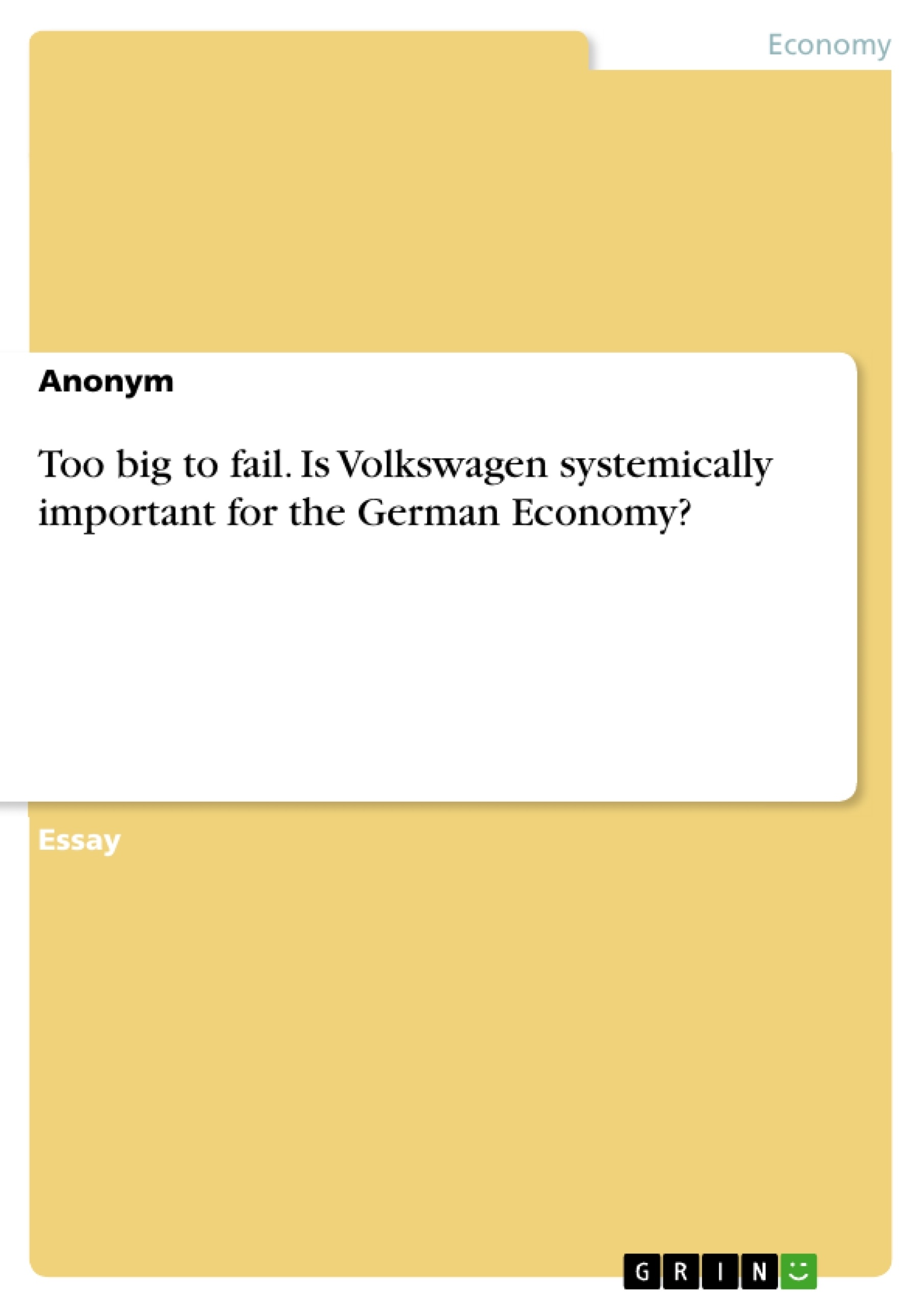The Volkswagen Group (VW) is one of the world´s leading automobile manufacturers and the largest carmaker in Europe, based in Wolfsburg, Germany. On September 18th, 2015, the U.S. Environmental Protection Agency (EPA) issued a press release regarding a “Notice of Violation” (NOV) of the Clean Air Act (CAA) to the Volkswagen. Due to these recent emissions issues, especially in the North American Regions, an essential question is: “What would happen in case of a failure of VW?” With regard to this question, the subject of this academic paper is an analysis whether VW can be categorized as a systemically important company. For this, firstly a definition of “systemic importance” will be given in chapter 2. Subsequently the main indicators, which characterize a company as systemical important, will be introduced. Furthermore various examples of government interverntion in Germany, like for example the rescue of the construction company Holzmann, will revealed at the end of the second chapter.
The third chapter concentrates on VW per se. Intention of this chapter is to provide a brief overview of the main facts related to VW. Therefore firstly the key figures of VW will be introduced in terms of volume data like for instance sales volume, sales revenue or workforce as well as in terms of financial data, like for instance operating earnings. Subsequently the key points of the emissions issue related to various diesel engines will be depicted. Chapter 2.3 focusses on the impacts due to the emissions issue on VW. Content of chapter four is an analysis of systemical importance of the VW Group, which will be conducted based on the collected set of information about VW in chapter 3, with regard to the indicators for systemical importance, introduced in chapter 2.1. Subsequently a critical statement on the main question of this academic paper, “Is VW systemically important for the German economy?” will be infered based on the results of the analysis. Finally chapter 5 summarizes the main findings, gained by the analysis of systemical important characteristics of the Volkswagen group.
Inhaltsverzeichnis (Table of Contents)
- Introduction
- Systemic Importance
- Definition
- Impacts of systemically important companies on economies
- Examples of government Help in Germany
- Volkswagen
- Main Facts
- The emissions issue
- Impacts on VW due to the emissions issue
- Analysis of Systemical Importance of VW
- Conclusion
Zielsetzung und Themenschwerpunkte (Objectives and Key Themes)
This academic paper aims to analyze whether Volkswagen (VW) can be categorized as a systemically important company, particularly in light of its recent emissions issues. The paper begins by defining "systemic importance" and outlining the key indicators that characterize a company as such. It then examines the potential impacts of a failure by a systemically important company on economies. The paper then focuses on VW, providing a brief overview of the company's main facts, the emissions issue, and the resulting impacts on the company. Finally, the paper analyzes the systemic importance of VW based on the collected information, concluding with a statement on whether VW is systemically important for the German economy.
- Definition of "systemic importance"
- Impacts of systemically important companies on economies
- Analysis of VW's systemic importance
- Government intervention in the case of systemically important companies
- The impact of VW's emissions issue on its systemic importance
Zusammenfassung der Kapitel (Chapter Summaries)
- Introduction: This chapter introduces the research question regarding VW's systemic importance in the context of its recent emissions issues. It outlines the structure of the paper, with chapters dedicated to defining systemic importance, examining VW's characteristics, and analyzing its systemic importance for the German economy.
- Systemic Importance: This chapter defines "systemic importance" and explores its significance in the context of economic regulations. It introduces various criteria for categorizing companies as systemically important, including size and market concentration, cross-linking level, and insufficient substitutability. The chapter also discusses the potential impacts of a failure by a systemically important company on economies, drawing on the findings of a 2013 study by Sean P. McAlinden and Debra Maranger Menk of the Center for Automotive Research. Finally, the chapter provides examples of government intervention in Germany to rescue systemically important companies, such as the rescue of Holzmann and Commerzbank, as well as the case of Opel, where the German government declined intervention.
- Volkswagen: This chapter provides an overview of VW, focusing on its main facts, including sales volume, sales revenue, and workforce. It also discusses the key points of the emissions issue related to VW's diesel engines and analyzes the impacts of this issue on the company. This includes exploring the potential consequences for VW's financial performance, reputation, and market position.
Schlüsselwörter (Keywords)
This paper explores the concept of "systemic importance" in the context of the German economy, focusing on the case of Volkswagen (VW). Key themes include: systemic importance, economic regulations, financial crisis, government intervention, company failure, emissions scandal, automotive industry, Germany, VW, and economic impact.
- Citation du texte
- Anonym (Auteur), 2016, Too big to fail. Is Volkswagen systemically important for the German Economy?, Munich, GRIN Verlag, https://www.grin.com/document/376322



